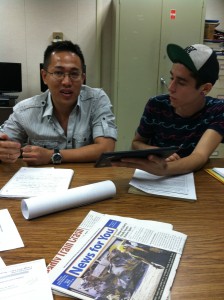“The problem’s plain to see
Too much technology
Machines to save our lives
Machines, de-humanize…”
-“Mr. Roboto,” Styx

For some reason in middle school I was obsessed with Styx, especially the song “Mr. Roboto.” I think my friends and I were the only 13-year-olds at their reunion tour.
As some others have already posted, there isn’t really an inherent connection between implementation of Common Core/Essential Standards and the success or failure of technology in the classroom. I do have to admit: when I saw the increased rigor and deeper analysis that the ELA Common Core rested upon, I had an excited vision of laptops closed, books open, and the class being guided by sticky notes, pencils, and old-fashioned face-to-face discussion. In fact, it was during one of those scenarios this past year that I got the BEST review from my principal ever! He said I was doing a great job implementing the rigor and complexity of the Common Core Standards. Sure I didn’t use technology–that time– but it should not be an every second, every day requirement. I was confident an administrator would return during a meaningful use of technology. There was no reason to put on, as one of the other posters hilariously referred to it as, a “dog and pony show.”
I have realized that there is no need to be an alarmist that there is “too much technology” in the classroom (hear that, Styx??). The world is changing, and in order to prepare my students not only for the Common Core, but for successful LIVES, it is my duty to keep abreast of new technology so I can thoughtfully choose meaningful resources to enhance my curriculum.
HOWEVER—and this is huge—it is also our job to allow students to think without technology in order to truly meet the lofty goals of the Common Core. Sometimes they need to “grapple with the text” (buzzword!) using their own brains and each other’s. Sometimes googling the answer limits the scope of all possibilities of what the answer COULD be.
When used thoughtfully, technology enhances the curriculum.
When used thoughtfully, Common Core enhances the curriculum.
Let’s use both thoughtfully, and neither for lip service.
To conclude, a happy Lenovo tablet story! My adult ESL and basic education students have LOVED using the tablet with me during our night classes this summer. Most are not yet computer literate, and the tablet is much less intimidating than a desktop. Last night, the ESL students used the tablet to tape each other during speaking practice.

My assistant Connor using the tablet to record Lan talking about what it takes to be considered an ethical person.
They then listened back to their conversation (none of them had ever heard their recorded voice before!) and wrote down what to fix. For the FIRST TIME, they were able to realize what they need to fix to allow people to understand them better. Since I’ve been teaching some of them for almost three years, this is BIG. Success!



